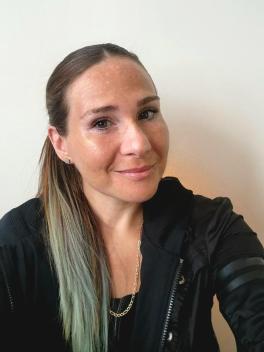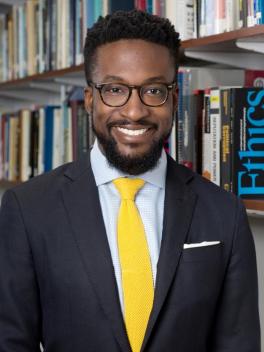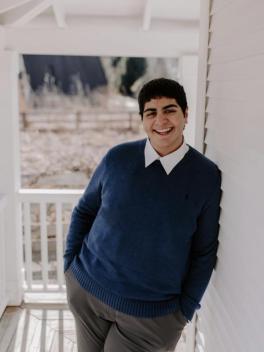
Profile: Dr. Terrance Hinton
Dr. Terrance Hinton (pronouns: He/him/his) is a Lecturer in the Department of Sociology at Ohio State's Columbus campus. In addition to this role, he also serves as a member of the OPEEP Advisory Council. Hinton's educational background includes an M.S. in Criminal Justice from Southern University Agricultural and Mechanical College and a Ph.D. in Public Policy and Administration from Walden University. His areas of expertise include criminal justice reform, incarceration and reentry, and workforce development for the justice-involved.
In the upcoming Spring 2023 semester, he will teach his first OPEEP class, SOC 2211S: Corrections - An OPEEP Course, at the Ohio Reformatory for Women on Mondays from 12:30-3:15pm. Hinton also teaches several other courses, including SOC 4615: Control and Prevention of Crime and Delinquency, SOC 2310: Sociology of Gangs, and PUBAFRS 5506: Administration of Criminal Justice Policy.
How and when did you become involved with OPEEP?
"I first heard about OPEEP in the Spring of 2021 and reached out to Dr. Thomas and Dr. Morris to see how I could get involved. I eventually got enrolled into the instructor training in May of 2021 and will be teaching my first class next Spring."
Could you briefly describe your interest in and/or background with incarceration?
"My work within the Reentry field stems from my time as a Program Manager for Reentry Services for a non-profit organization called Alvis Inc, in Columbus, Ohio. As Program Manager, I oversaw the day-to-day operations of two workforce development programs called the HIRE (Help in Reentry Employment) and EDGE (Empower Develop By Gaining Employment) program. These adult based programs were designed to assist justice involved individuals in overcoming barriers to skilled employment opportunities. I also facilitated anger management, workforce development and cognitive behavioral therapy courses as well as the development of structured recreational activities for clients who resided in Alvis halfway house facilities. To date I have mentored and assisted over 3000 formerly incarcerated individuals."
What have you enjoyed the most about your involvement with OPEEP thus far?
"The opportunity to learn from both inside and outside students and more importantly go on this learning journey together!"
What is one thing that you wish more people knew about OPEEP/higher education in prison more generally?
"Education can empower both our inside and outside students to be the best version of themselves!"
What do you like to do in your free time?
"Physical Fitness, Watching Football, Time with my Kids, Reading, and Naps!!!"

Profile: C. Ray
Born in Columbus, Ohio, C. Ray (pronouns: She/her/hers) is both a graduate student in Ohio State's ASAP Master of Social Work program and a member of the OPEEP Advisory Council. Ray was incarcerated for three years in an Ohio women’s prison, and witnessed the injustice and inequalities within the American legal system first-hand. This is also where she learned that her passion and purpose are in prison advocacy and reform. Upon her release in 2018, she enrolled in The Ohio State University and obtained her Bachelor's in Social Work. Ray married her wife in 2020, and they are currently raising their fur baby. Upon obtaining her MSW, Ray hopes to continue on the path of social justice and prison advocacy.
How and when did you become involved with OPEEP?
"I met Dr. Mary Thomas through my work with Healing Broken Circles (HBC) in 2021. HBC is a local non-profit that works with justice involved individuals. We quickly became friends and she informed me about her work with OPEEP. I was working on my BSSW at the time and applied to be allowed into ORW to take one of the OPEEP classes. Due to my past criminal record and a filing error I was denied at the time but still very much interested in OPEEP. This summer Mary reached out to me and asked if I would like to be a part of the OPEEP board. I was extremely excited and eager to be involved with OPEEP and was permitted to be on the board for the 2022-23 year! I hope to remain involved in whichever capacity I will be able to."
Could you briefly describe your interest in and/or background with incarceration?
"I graduated high-school in 2008 in the height of the opiate epidemic and by no means was exempt from it. I struggled with addiction on and off for almost 12 years. This path led me to a prison cell in 2014 and again in 2015. After serving three years I was released in 2018. I met some of the most amazing, intelligent, genuine and talented individuals I have ever had the pleasure of meeting during my incarceration and knew that I had to do what was in my power to help them. While incarcerated we were a community and helped one another grow. I heard the stories and saw the injustices of the prison system and promised myself once I got out I would help those who did not have that luxury. Upon my release I found like minded organizations which led me to OPEEP. OPEEP is doing amazing work and I can only hope that through them I can help those affected by the justice system."
What unique qualities, insights, experiences, or expertise do you feel that you bring to the table as a member of the OPEEP Advisory Council?
"Working on my MSW I have a foundation in the social sciences. I do believe my incarceration and history with addiction is an asset in that I am able to relate to those incarcerated on a peer level. I am involved with various reentry organizations and can be an asset with reentry services upon release for OPEEP students (or anyone being released). I have navigated that process of release/reentry to higher education and would love to be able to offer a hand to anyone interested in this path."
What have you enjoyed the most about your involvement with OPEEP thus far?
"It has been an honor to be able to meet and network with so many amazing different people and organizations. I love that OPEEP helps provide me with opportunities to grow, learn and meet new people!"
What is one thing that you wish more people knew about OPEEP/higher education in prison more generally?
"How many people are interested in participating in higher education inside and all the barriers that exist that prevents them from being able to. When I was incarcerated I wanted to take the Sinclair classes they offered but I would get tickets for stupid things like doing tattoos that would prevent me from obtaining education."
What do you like to do in your free time?
"In my free time I love spending time with my family, my wife and furbaby (chihuahua/corgi). We got to parks and love to travel when we can, see and learn new things. We love haunted/spooky things. I love street art, when we travel we always go look at the local graffiti (and sometimes leave some of our own!)"
Any further comments you'd like to share with readers?
"When I was incarcerated it was my dream that I would get out of prison and come back from the other side. To be able to work with incarcerated individuals and give back, offering my experience and what I have learned along the way. Being involved with OPEEP is helping to provide me the opportunity to do this. I am excited and nervous but regardless I will remain involved in the solution to whichever capacity I am allowed."

Profile: Dr. Winston C. Thompson
In addition to being a member of the OPEEP Advisory Council, Dr. Winston C. Thompson (pronouns: he/him/his) is an Associate Professor in the Department of Educational Studies at Ohio State's Columbus campus. Thompson's scholarship explores ethical/political dimensions of educational policy and practice. His work centers on justice and the role of education in a pluralistic, democratic society. Building upon a project he initiated as a Fellow-in-Residence at the Edmond J. Safra Center for Ethics at Harvard University, Thompson is currently working on a monograph entitled, Justice in the Balance: Revitalizing Politics and Education.
In addition to these projects, Thompson is a PI on an international interdisciplinary grant supporting the Pedagogies of Punishment project, which brings together scholars from political theory, psychology, philosophy, and other disciplines to analyze ethical concerns related to practices of punishment in schools. Thompson is committed to careful normative theorizing that might inform policies addressing what citizens owe one another in response to their past actions and future possibilities.
How and when did you become involved with OPEEP?
"I became involved with OPEEP in 2020."
Could you briefly describe your interest in and/or background with incarceration?
"I've been working on ethical issues of punishment in educational settings (i.e., should school children be punished?) and it seemed right to also think seriously about ethical questions of education in punitive settings (i.e., what types of educational rights should be recognized inside?)."
What have you enjoyed the most about your involvement with OPEEP thus far?
"I've enjoyed being involved with such practical justice work. There is no ambiguity in my mind about the importance of OPEEP's mission. The clear values that drive my amazing OPEEP colleagues have been especially motivating."
What is one thing that you wish more people knew about OPEEP/higher education in prison more generally?
"I think too many people hold deeply flawed assumptions about identifying those who 'deserve' higher education. Seeing education as a political right may really shift those unchecked beliefs."

Profile: Muheeb Hijazeen
Muheeb Hijazeen (pronouns: he/him/his), is a second-year undergraduate student at the Ohio State University. He is both an OPEEP alum and a member of the project's Advisory Council. Hijazeen is on the Pre-Law track, studying Industrial & Systems Engineering with a minor in Clinical Psychology.
How and when did you become involved with OPEEP?
"I became involved with OPEEP spring semester of my freshman year. I took my first class at ORW with Dr. Morris in the spring of 2022 and that's when I fell in love with the program and what it stands for. I found a passion for the work this program does on a daily basis and the amazing bond that comes out of these classes between the inside and outside students."
Could you briefly describe your interest in and/or background with incarceration?
"My interest in incarceration stemmed from educating myself on our unjust social system. During my time in high school, I took initiative to educate myself and others on the problems we are facing in our country, one of them being the mass incarceration of marginalized groups and the inhumane environments in prison. Understanding the harms caused by these institutions I knew I wanted to become more involved with the work that helps put an end to the cycles that are caused by these groups. Learning about OPEEP through Dr. Morris I knew right away that these classes are much more than simple college courses. These are experiences that will help drive change and continue building a community for incarcerated individuals to understand the importance of fighting for their rights and gaining the opportunity for higher education."
What have you enjoyed the most about your involvement with OPEEP thus far?
"The thing that I [have] enjoyed the most about my involvement with OPEEP is serving on the advisory board and getting the opportunity to work with individuals from all walks of life. Getting to work with such a diverse group has allowed me to challenge my ideology and helped grow my passion for providing higher education to incarcerated individuals. It has also motivated me to share my experience with others in hopes of inspiring my peers to go through this amazing journey."
What is one thing that you wish more people knew about OPEEP/higher education in prison more generally?
"I wish more people understood the importance of destigmatizing incarceration. OPEEP has done a great job at helping students learn and view the world from a different perspective. The project has continually worked on giving OSU students the gate to learn more about our country's unjust social structure and the way marginalized groups are targeted, which is why I wish more people educated themselves on these topics."
What do you like to do in your free time?
"In my free time I enjoy trying out new coffee shops and listening to music. My favorite artists to listen to are Drake and Adele."
OPEEP Advisory Council members not profiled in this article include Seyan Coco, Kourtney Newberry, Story Edison, Amber Michael, Nadir Joyce, Ramon Reid, Dr. Alia Dietsch, Dr. Nicole Nieto, Dr. Amy Shuster, and Dr. Shannon Winnubst. OPEEP Co-Directors and staff members would like to thank all Advisory Council members for their continued dedication to the project and their embodiment of its core values in their work and everyday lives.
